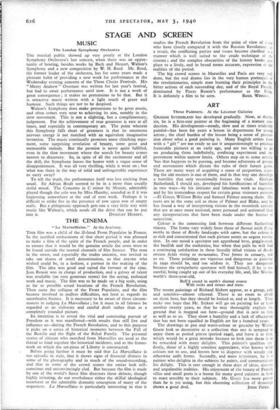THE CINEMA
"La Marseillaise." At the Academy.
Tins film was a child of the ill-fated Front Populaire in France. In the justified enthusiasms of that short period it was planned to make a film of the spirit of the French people, and in order to ensure that it would be the genuine article the costs were to be found outside the normal channels of film finance. The man in the street, and especially the trades unionist, was invited to take out shares of small denomination, so that anyone who wished could be, in a fashion, a partner in the making of the film. The idea was good and suited the fervour of the time. Jean Renoir was in charge of production, and a galaxy of talent was available (on very generous terms) for the acting, technical work and music. The film was to be made on a big scale, using as far as possible actual locations of the French Revolution. Then came the collapse of the Front Populaire, and the film became involved in endless difficulties, not least as regards its unorthodox finance. It is necessary to be aware of these circum- stances in judging La Marseillaise ; for it must in all fairness be regarded as an elaborate and careful draft rather than as a completely rounded picture.
Its intention is to reveal the vital and continuing pursuit of Freedom as it was manifested—with results that still live and influence us—during the French Revolution, and to this purpose it picks on a series of historical moments between the Fall of the Bastille and the flight of the Rdyal Family. The personal stories of citizens who marched from Marseilles are used as the thread to bind together the historical incidents, and as the frame- work on which the set-piece of Liberty is constructed.
Before going further it must be said that La Marseillaise is too episodic in style, that it shows signs of financial distress in some of the photography and in much of the sound-recording, and that in some of the crowd scenes the extras look self- conscious and unconvincingly dad. But because the film is made by one of the world's finest film directors these defects, though highly irritating, do not overbalance either the skilful ideological treatment or the admirable dramatic conception of many of the sequences. La Marseillaise is particularly interesting in that it
studies the French Revolution from the point of view of those who have closely compared it with the Russian Revolution : as a result, the conflicting parties and issues become clarified in a manner which is well suited to the crude technique of the cinema ; and the complex obscurities of the history books give place to a lively, and in broad terms accurate, expression of the realities of the period.
The big crowd scenes in Marseilles and Paris are very well done, but the real drama lies in the very human portrayals of the revolutionaries, simple men learning their principles in the bitter actions of each succeeding day, and of the Royal Family, dominated by Pierre Renoir's performance as the King.
It is definitely a film to be seen. BASH. WRIGI1 r.


































 Previous page
Previous page